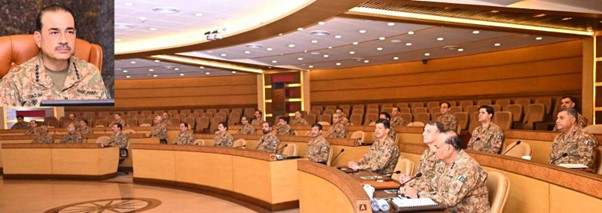One day after a deadly explosion in Khuzdar claimed six lives, including four children, Pakistan’s military leadership has renewed its resolve to eradicate India-backed terrorism and its facilitators.
According to a detailed statement from the Inter-Services Public Relations (ISPR), the armed forces will not rest until all hostile elements are dismantled. These threats, trained and funded to spread fear and disrupt peace, will be crushed using the full force of national unity and institutional power.
This strong message followed the 270th Corps Commanders’ Conference, chaired by Chief of Army Staff Field Marshal Syed Asim Munir at the General Headquarters in Rawalpindi.
The meeting began with prayers for the martyrs of Operation Bunyan-um-Marsoos and the victims of the brutal attack in Khuzdar. This terror strike, blamed on India-sponsored terrorism, took the lives of four innocent children and two adults.
The military leaders condemned the act in the strongest terms. They called it a deliberate attack on civilians and especially children—something that defies all human and international norms.
During the session, commanders examined the growing threat of terrorist proxies supported by India, especially in Balochistan and Khyber Pakhtunkhwa. They agreed that India, having failed militarily after the Pahalgam incident, has shifted to using covert networks and non-state actors to destabilize the region.
Despite claiming to be a victim, India continues to sponsor aggression. The top brass asserted that Pakistan will never allow its peace to be undermined by foreign interference or external terrorism.
The military vowed to chase down every agent and enabler of India-backed terrorism, in close coordination with intelligence and law enforcement bodies. The armed forces are fully committed to safeguarding the nation’s peace and integrity.
This strategic gathering took place against the backdrop of heightened Pakistan-India tensions. Last month, 26 tourists were killed in Indian Illegally Occupied Jammu and Kashmir (IIOJK) during the Pahalgam attack. India accused Pakistan without evidence and responded with drone and missile attacks. These strikes killed 53 people, including 13 soldiers and 40 civilians.
Pakistan retaliated forcefully. Over 80 Indian drones and six fighter jets, including three Rafales, were shot down. Pakistan then launched Operation Bunyan-um-Marsoos, targeting several Indian military installations in a wide-ranging response.
Officials described Pakistan’s strikes as “precise and proportionate”. These actions came after continued Indian attacks across the Line of Control and inside Pakistani territory. India claimed its strikes were aimed at “terrorist bases,” but Pakistan viewed them as clear acts of aggression.
The clashes lasted 87 hours and ended on May 10 after a ceasefire agreement brokered by the United States.
The ISPR also paid tribute to the martyrs of Marka-e-Haq, the term used for the April 22–May 10 conflict. Their sacrifice, the military said, will never be forgotten. Protecting the people of Pakistan remains the army’s highest mission.
The military leadership emphasized that no force can intimidate Pakistan. The army reviewed the current security challenges, praising the success of Operation Bunyan-um-Marsoos. The armed forces, with the support of the nation, repelled aggression with unmatched clarity and professionalism.
The top commanders also appreciated the role of Pakistani media and digital warriors who exposed Indian propaganda, countered fake news, and helped build public confidence. The contribution of Pakistani youth was highlighted too. Their energy and patriotism helped raise national morale.
The political leadership was also commended for its firm direction during the crisis. According to the commanders, history will remember Pakistan’s swift, strategic, and confident defense against enemy threats.
The forum reaffirmed Pakistan’s commitment to protect its land and sovereignty. No hostile power will be allowed to damage the country’s core interests.
The army also reviewed the security situation along the Line of Control, the Working Boundary, and the Eastern Border. Serious concern was expressed over continued human rights abuses in IIOJK. These violations, they warned, only fuel resistance and increase instability.
The leadership urged the global community to intervene before the situation worsens. Pakistan remains committed to supporting Kashmiris politically, diplomatically, morally, and humanely in their struggle for self-determination.
Field Marshal Asim Munir praised the operational readiness, morale, and discipline of the armed forces. He thanked the people of Pakistan for standing with the military during this critical time.
He reminded all commanders to stay alert and ready to face emerging threats. He stressed that the strength of the nation lies in its people.
In closing, he reaffirmed the army’s vital role in ensuring peace at home and securing borders. The Corps Commanders expressed full confidence in the capability, readiness, and dedication of all formations.
The meeting ended with a special note of congratulations to Field Marshal Munir for his elevation in rank. His strategic insight, leadership, and commitment to national defense were recognized and applauded.


